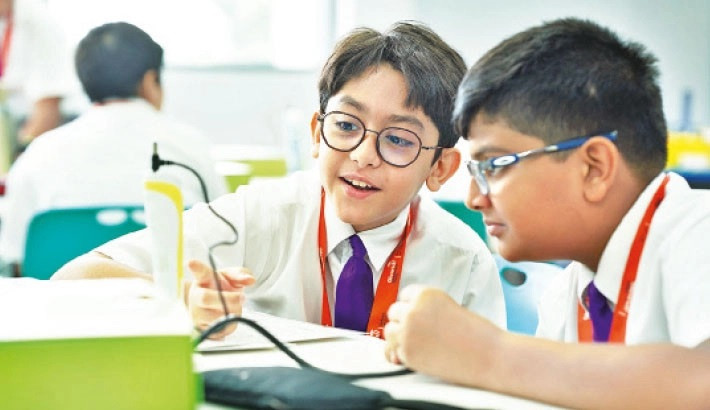
The journey of the internet has been nothing short of transformative at both the individual and societal levels. As a key driver for human progress, the internet has spurred major milestones in the form of innovation, marking the path of evolution in this millennium.
Today’s children live in a world where the Internet of Things (IoT), data analysis or Big Data, artificial intelligence, and virtual, augmented, or mixed reality exist as a norm. Under such circumstances, what role do parents, guardians, and educators play in guiding the children who grow up in this modern era?
According to a survey by the Bangladesh Bureau of Statistics (BBS), 38.1 percent of households now have internet access, with 29.7 percent in rural areas and 63.4 percent in urban areas. The proportion of households with computers has risen from 5.7 percent in 2013 to 8.7 percent in 2022, with rural areas at 3.1 percent and urban areas at 25.6 percent.
Children are gradually exposing to techs at home, using internet to share study materials and connect with teachers and peers globally. Platforms like Coursera and 10-Minute School are providing digital learning opportunities to millions of students in Bangladesh.
When done right, the use of the Internet in education can help children by increasing learning opportunities and building lifelong digital skills. A groundbreaking UNICEF-LSE report surveyed nearly 15 thousand children across 11 countries on internet use. It found that the activities children engage in online, even those typically seen as entertainment is crucial for building digital skills.
The internet's integration into education empowers students to become independent learners. They can conduct online research, share notes, access academic databases, and participate in distance learning programs. In STEM fields, virtual laboratories offer cost-effective experimentation and simulation opportunities. Teachers leverage online tools like educational games and multimedia presentations to enhance lesson engagement. Advanced AI technologies foster crucial skills like communication and problem-solving, enriching learning experiences with unique resources.
The internet transforms learning by providing unparalleled access to a wide range of educational resources, including textbooks, multimedia materials, and online libraries. This democratization of knowledge empowers students from diverse backgrounds to pursue their educational goals, fostering inclusivity in education.
Moreover, the internet facilitates the infusion of technology into classrooms, enabling educators to embrace innovative teaching methodologies. Platforms like Google Classroom, Microsoft Teams, and Khan Academy serve as essential tools for delivering personalized instruction, fostering collaboration, and providing real-time feedback. For instance, the coding platforms such as ‘Scratch’ and ‘MakeCode’ are integrated into curricula, where students learn block-based coding languages. This hands-on approach not only cultivates computational thinking and problem-solving skills but also equips students for the challenges of the digital era.
The internet's influence extends beyond connectivity, catalyzing the growth of edtech startups and companies in Bangladesh. Pioneers like Brain Station 23, CodersTrust, and Sheba Platform Limited are leveraging technology to develop educational apps, online learning platforms, and tailored digital content, enhancing access to quality education.
As a parent, it is normal to feel worried about raising a child in the world of an ever-changing technological and digital landscape. However, the truth is that technology can be a powerful tool when it comes to education. It can leave an immense positive impact on the children’s overall development. While the transformation of the internet has occurred very quickly over time, the power is in our hands as to how we want to leverage the benefits of this transformation.
___________________________________________
Ashfia Ashraf is computer science teacher at Glenrich International School

